Energy Efficiency
Boosting Heat Pump Efficiency: Essential Tactics

Liberate your heat pump’s true potential!
In our quest for optimal efficiency, we’ve uncovered essential tactics to boost performance.
From understanding efficiency ratings to smart thermostat integration, we’ll guide you through the maze of choices.
Proper sizing and installation techniques are crucial, while regular maintenance ensures peak performance.
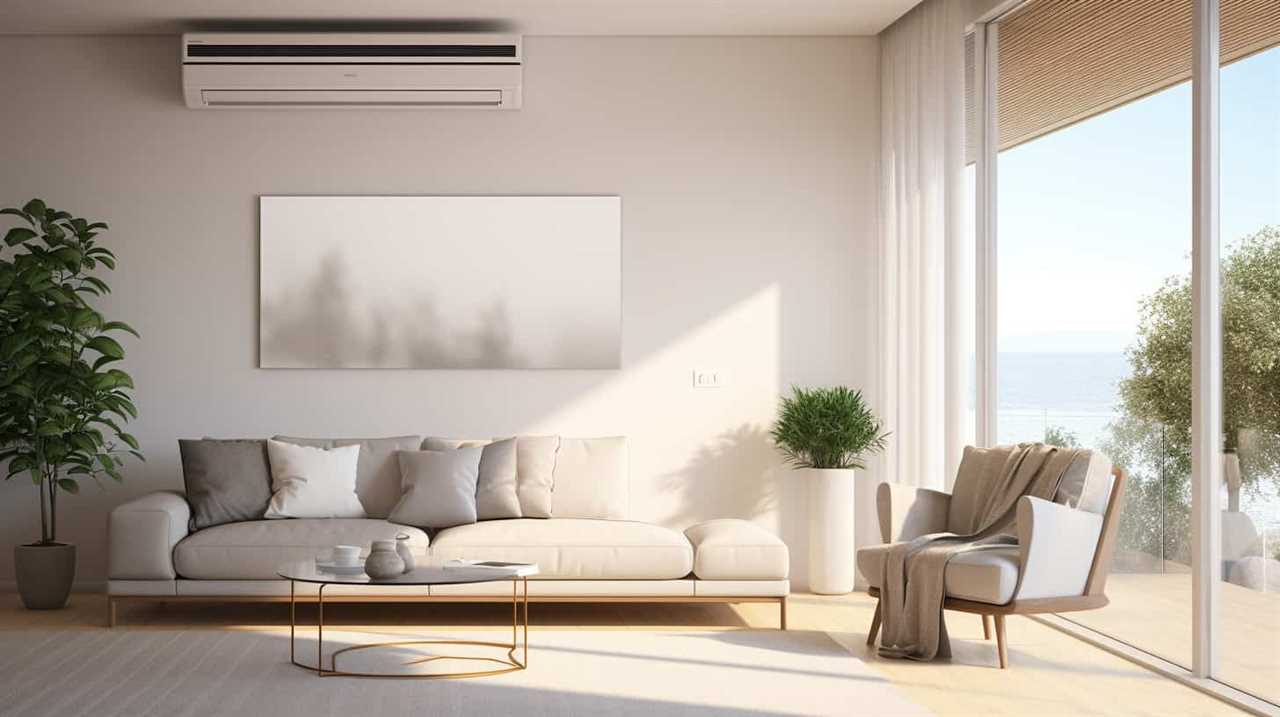
And for the ultimate energy savings, upgrading to efficient models is the way to go.
Get ready to unlock the power of your heat pump and reclaim control over your energy usage.
Key Takeaways
- Understanding heat pump efficiency ratings (SEER and HSPF) and choosing higher-rated models can lead to improved performance and energy savings.
- Regular maintenance, including cleaning air filters and scheduling professional servicing, is crucial for optimal heat pump performance and energy efficiency.
- Proper sizing, installation techniques, and regular maintenance maximize heat pump efficiency and minimize energy consumption.
- Smart thermostat integration enhances heat pump efficiency by optimizing temperature settings, allowing for remote control and scheduling, and improving overall energy management.
Understanding Heat Pump Efficiency Ratings
We need to understand the heat pump efficiency ratings in order to make informed decisions about our HVAC systems. Heat pump efficiency standards are crucial to evaluating the performance of these systems and ensuring energy savings.
The efficiency rating of a heat pump is measured by its seasonal energy efficiency ratio (SEER) and heating seasonal performance factor (HSPF). SEER indicates the cooling efficiency, while HSPF measures the heating efficiency.

Higher SEER and HSPF values indicate improved performance and energy savings. By choosing a heat pump with higher efficiency ratings, we can reduce energy consumption and lower utility bills.
It’s important to note that improving heat pump performance also involves regular maintenance, such as cleaning or replacing air filters, proper insulation, and professional servicing.
Understanding and considering these efficiency ratings will empower us to make informed choices and maximize our HVAC system’s potential.
Proper Sizing and Installation Techniques
To ensure optimal efficiency and performance, proper sizing and installation techniques are essential for heat pumps. Here are three key factors to consider when it comes to proper sizing techniques and installation best practices:
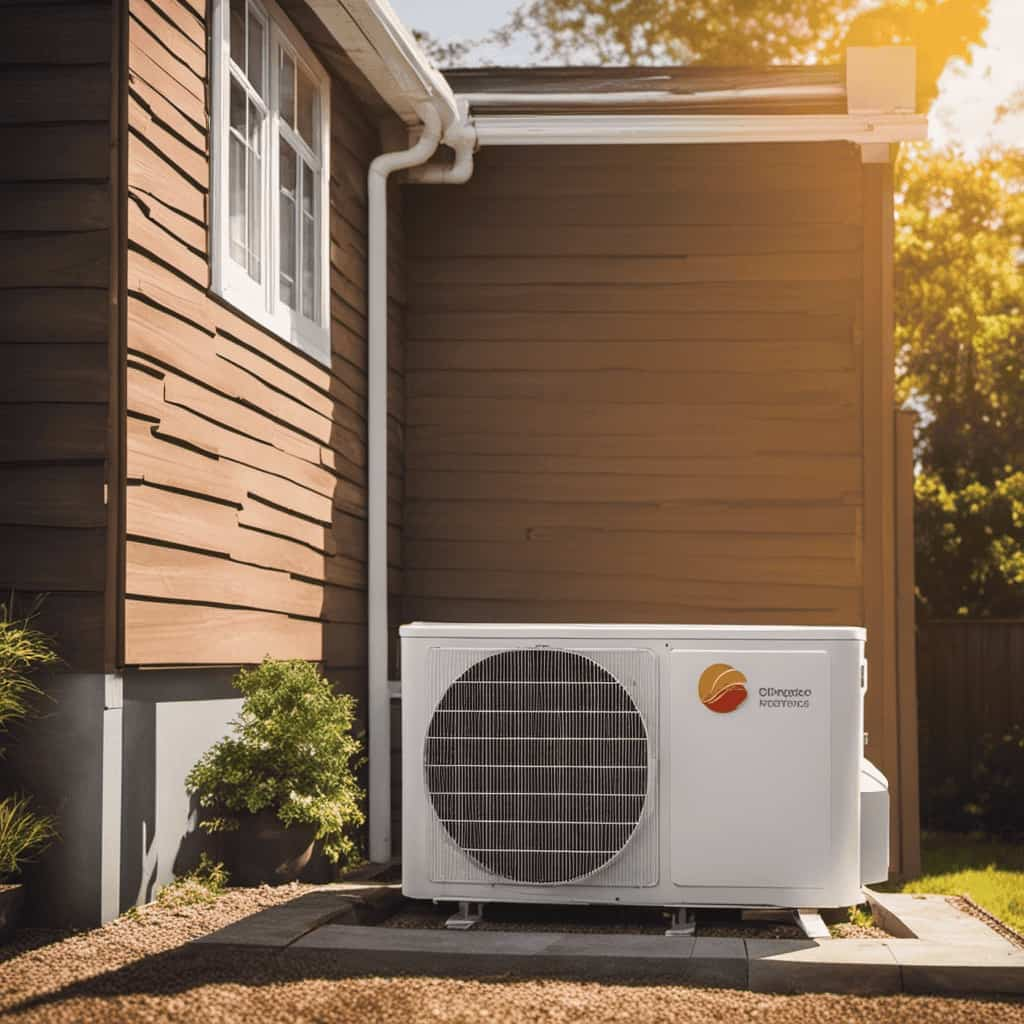
-
Accurate Heat Load Calculation: Properly sizing a heat pump involves conducting a thorough heat load calculation to determine the heating and cooling requirements of the space. This calculation takes into account factors such as the size of the area, insulation levels, and local climate conditions. By accurately sizing the heat pump, you can ensure that it operates efficiently and effectively.
-
Ductwork Design and Sealing: Proper installation of the ductwork is crucial for optimal heat pump performance. It’s important to design the ductwork system to minimize air leaks and pressure losses. Additionally, sealing the ducts properly helps to prevent energy waste and maintain consistent airflow throughout the space.
-
Correct Refrigerant Charge: The proper refrigerant charge is crucial for the efficient operation of a heat pump. It’s essential to follow manufacturer guidelines and ensure that the refrigerant charge is neither undercharged nor overcharged. Incorrect refrigerant levels can lead to reduced efficiency, increased energy consumption, and potential damage to the system.
By following these proper sizing techniques and installation best practices, you can maximize the efficiency and performance of your heat pump. However, regular maintenance is also key to optimal performance and will be discussed in the next section.

Transition: Now that we’ve covered the importance of proper sizing and installation techniques, let’s move on to the next topic: regular maintenance, which is essential for maintaining optimal heat pump performance.
Regular Maintenance: Key to Optimal Performance
Regular maintenance is a crucial aspect of ensuring optimal performance for heat pumps. By regularly maintaining your heat pump, you can enjoy a range of maintenance benefits, including improved energy efficiency, extended lifespan, and reduced repair costs.
To keep your heat pump running smoothly, there are a few troubleshooting tips you can follow. First, regularly clean or replace the air filters to ensure proper airflow. Secondly, check and clean the outdoor unit to remove any debris or obstructions. Additionally, make sure the thermostat is set correctly and consider scheduling professional maintenance at least once a year to address any potential issues.
By following these maintenance tips, you can maximize the performance and efficiency of your heat pump, saving energy and reducing environmental impact.

Now, let’s explore the next section on upgrading to energy-efficient heat pump models.
Upgrading to Energy-Efficient Heat Pump Models
When considering ways to boost heat pump efficiency, one essential tactic is upgrading to energy-efficient heat pump models. Upgrading to energy-efficient heat pump models can provide significant benefits in terms of energy savings and overall system performance. Here are three key reasons why upgrading to energy-efficient heat pump models is a smart choice:
-
Heat Pump Rebates: Many utility companies and government agencies offer rebates and incentives for upgrading to energy-efficient heat pump models. These rebates can significantly offset the cost of purchasing and installing a new heat pump, making it a more affordable option for homeowners.
-
Energy Savings: Energy-efficient heat pump models are designed to consume less energy while providing the same level of heating and cooling performance. This means that homeowners can enjoy reduced energy bills and long-term savings on their heating and cooling expenses.

-
Energy Savings Analysis: Before making the decision to upgrade, it’s important to conduct an energy savings analysis. This analysis will help homeowners determine the potential energy savings they can achieve by upgrading to an energy-efficient heat pump model, allowing them to make an informed decision based on their specific energy needs and budget.
Smart Thermostat Integration for Enhanced Efficiency
Our research indicates that utilizing smart thermostat integration can significantly enhance heat pump efficiency and lead to greater energy savings. By incorporating energy-saving programming and remote temperature monitoring, homeowners can better control and optimize their heat pump’s performance.
Smart thermostats allow users to set customized temperature schedules based on their unique preferences and daily routines. This energy-saving programming ensures that the heat pump operates efficiently, reducing unnecessary energy consumption during periods of low activity or when the house is unoccupied.
Additionally, smart thermostats enable remote temperature monitoring, allowing homeowners to adjust settings from anywhere using their mobile devices. This feature is particularly useful when unexpected schedule changes occur, ensuring that the heat pump adjusts accordingly to provide comfort while minimizing energy waste.
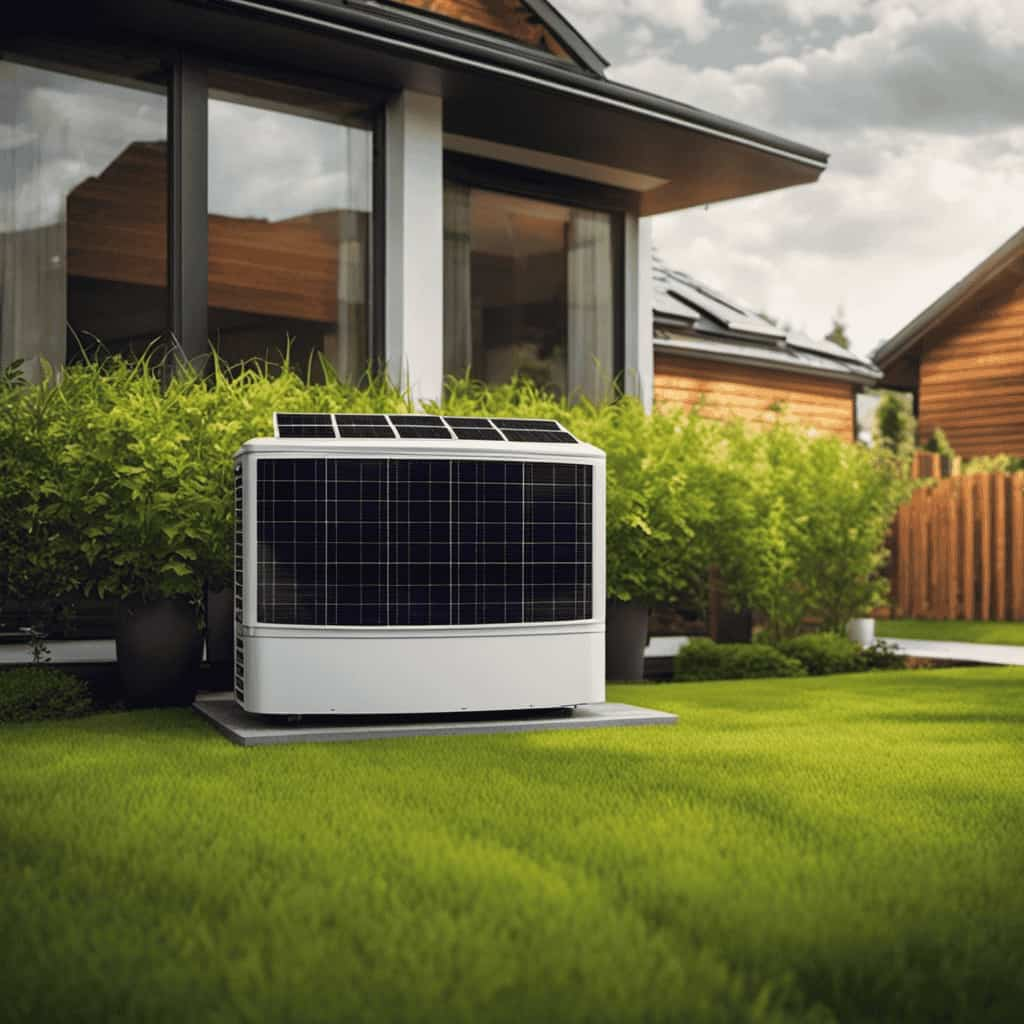
The integration of smart thermostats with heat pump systems revolutionizes the way homeowners interact with their HVAC systems, providing greater control and energy savings.
Frequently Asked Questions
Are There Any Government Incentives or Rebates Available for Upgrading to an Energy-Efficient Heat Pump Model?
Yes, there are government incentives and rebates available for upgrading to energy-efficient heat pump models. These incentives aim to encourage the adoption of eco-friendly technology and make it more affordable for consumers.
What Are Some Common Signs That Indicate a Heat Pump May Need Regular Maintenance?
Common signs that indicate a heat pump may need regular maintenance include reduced airflow, strange noises, and inconsistent temperature control. It’s important to address these issues promptly to keep your heat pump running efficiently.
Can a Heat Pump Be Installed in Any Type of Home, or Are There Specific Requirements?
A heat pump can be installed in any type of home, but there are specific requirements to consider. Factors like space availability, electrical capacity, and existing ductwork can affect the heat pump installation process and its efficiency.
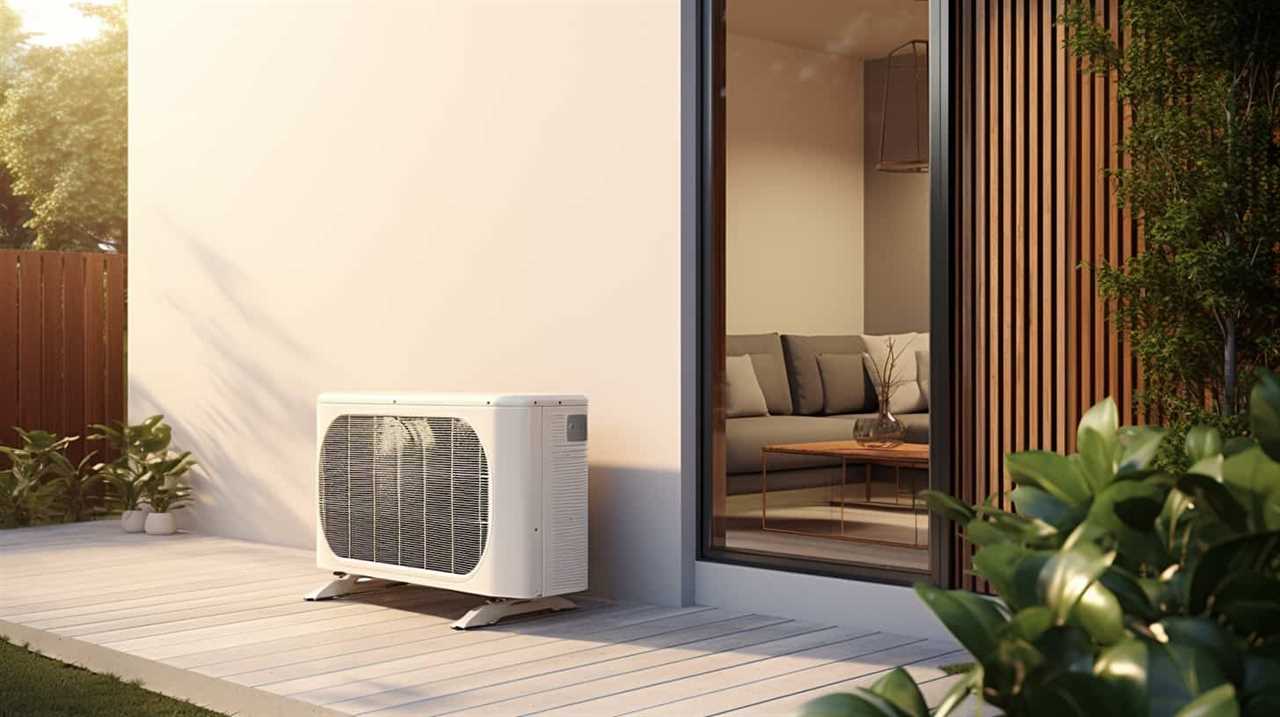
How Often Should a Heat Pump Be Serviced by a Professional Technician?
We recommend having a professional technician service your heat pump regularly to ensure optimal performance and efficiency. Regular heat pump maintenance frequency offers benefits such as improved lifespan, energy savings, and enhanced comfort in your home.
Can a Smart Thermostat Be Integrated With Any Type of Heat Pump, or Are There Compatibility Limitations?
Yes, a smart thermostat can be integrated with most types of heat pumps. However, there may be compatibility limitations depending on the specific models. Integrating a smart thermostat with a heat pump offers several benefits, such as improved energy efficiency and convenient remote control.
Conclusion
In conclusion, by implementing essential tactics such as understanding heat pump efficiency ratings, proper sizing and installation techniques, regular maintenance, and upgrading to energy-efficient models, we can significantly boost the efficiency of heat pumps.
Integrating smart thermostat technology further enhances this efficiency. Just as a well-tuned engine propels a car effortlessly down the road, these tactics ensure that heat pumps operate at peak performance, providing optimal comfort and energy savings.

Energy Efficiency
Slash Energy Bills: Mystery of Efficient Heat Pumps

We’ve all been there – dreading the arrival of our energy bills, wondering how we can possibly reduce our consumption without sacrificing comfort.
But what if there was a solution? Enter efficient heat pumps, the mysterious technology that promises to slash those bills and keep us cozy.
In this article, we’ll delve into the secrets behind these energy-saving wonders, exploring their technology, benefits, and cost-saving potential.
Get ready to unlock the mystery and take control of your energy consumption.
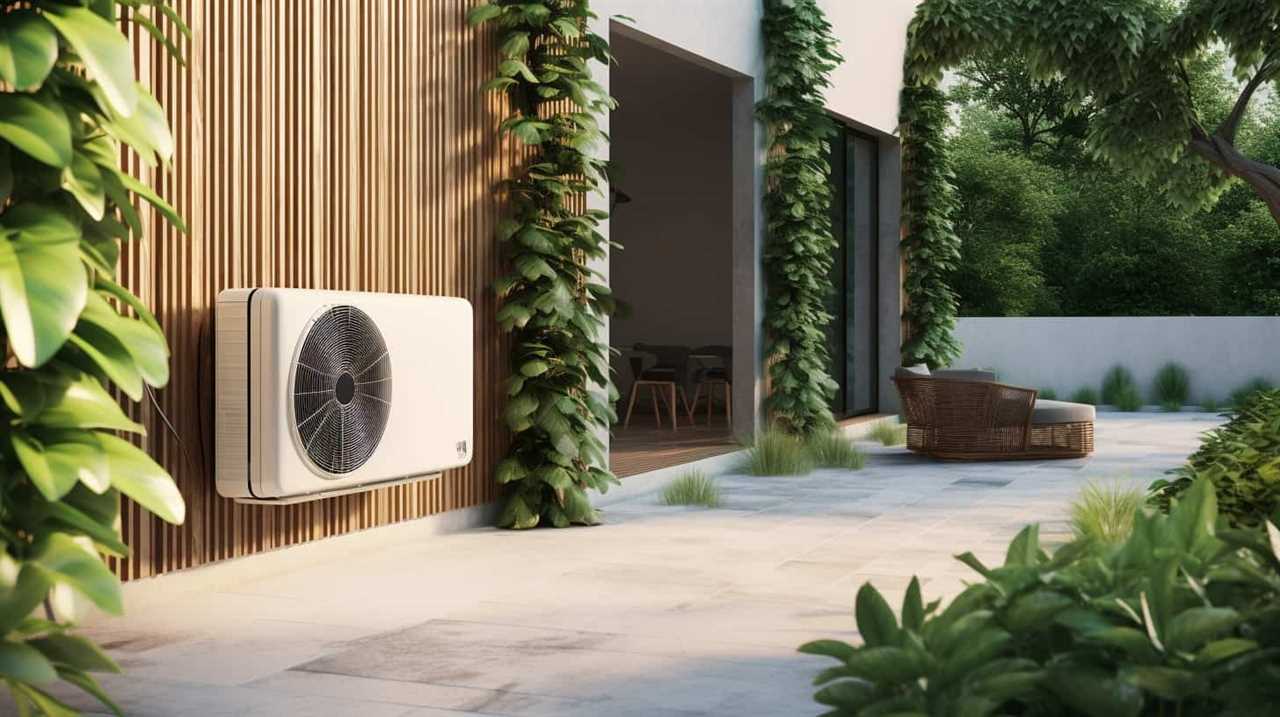
Key Takeaways
- Efficient heat pumps reduce energy consumption by utilizing advanced technology to transfer heat from one area to another.
- They help reduce carbon footprint by relying less on burning fossil fuels and require less energy compared to generating heat from scratch.
- Efficient heat pumps operate at higher efficiency levels, converting more energy into heat, which helps homeowners save money on energy bills and reduce environmental impact.
- Upgrading to an efficient heat pump system can result in reduced carbon footprint and lower greenhouse gas emissions, increased home comfort, and the ability for homeowners to control and customize temperature settings.
How Do Efficient Heat Pumps Reduce Energy Consumption
We can explain how efficient heat pumps reduce energy consumption by utilizing advanced technology and optimizing the transfer of heat from one area to another. By doing so, these heat pumps play a crucial role in reducing carbon footprint and increasing home comfort.
Unlike traditional heating systems that rely on burning fossil fuels, efficient heat pumps work by transferring heat from the air, ground, or water into the home, depending on the type of pump. This process requires significantly less energy compared to generating heat from scratch.
Additionally, efficient heat pumps are designed to operate at higher efficiency levels, meaning they convert more energy into heat. This helps homeowners save money on their energy bills while also reducing their environmental impact.
Understanding the technology behind efficient heat pumps will further demonstrate their potential in revolutionizing home heating systems.
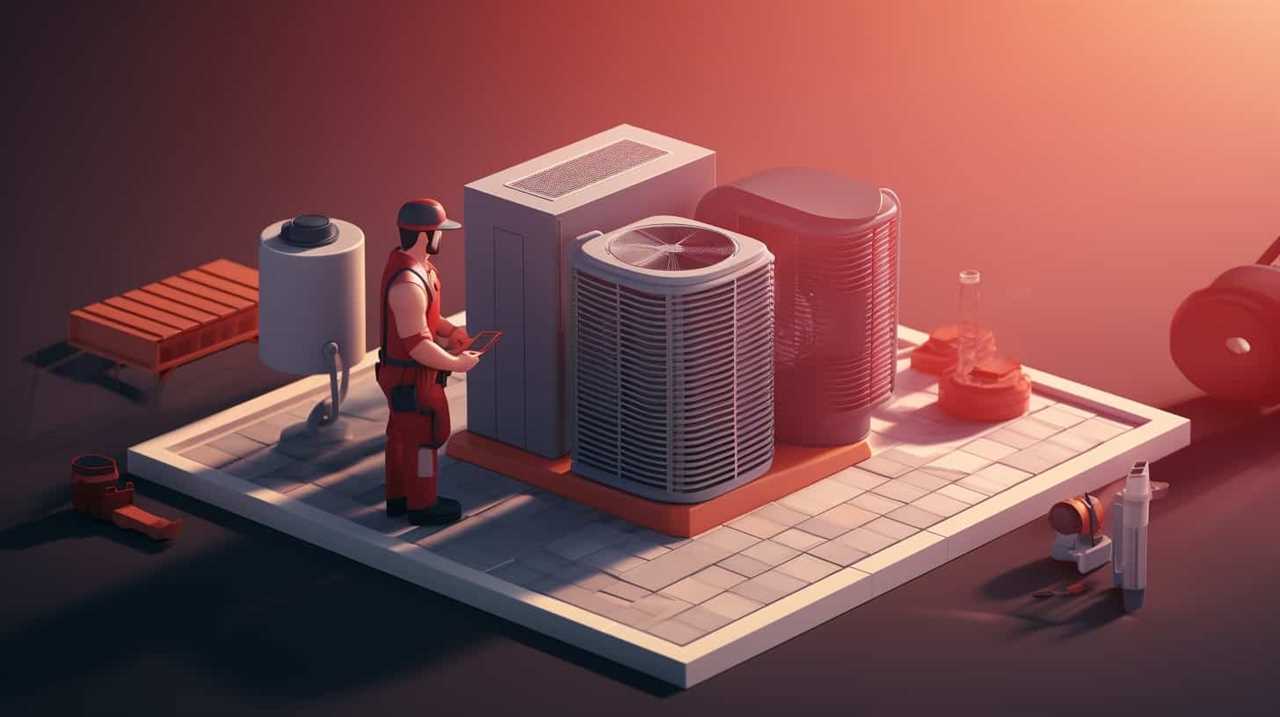
Understanding the Technology Behind Efficient Heat Pumps
By understanding the technology behind efficient heat pumps, we can gain insight into how this innovative system maximizes energy savings and improves home heating. Heat pump operation relies on the principles of thermodynamics and the refrigeration cycle. Here are the key elements to consider:
- Compressor: The heart of the heat pump, it increases the pressure and temperature of the refrigerant.
- Evaporator: Absorbs heat from the outside air or ground, causing the refrigerant to evaporate into a gas.
- Condenser: Releases heat into the home as the refrigerant condenses back into a liquid.
- Expansion valve: Regulates the flow of refrigerant, controlling the system’s efficiency.
Energy-saving features of efficient heat pumps include:
- Variable-speed motors: Adjust the compressor and blower speeds to match the heating or cooling needs, reducing energy waste.
- Smart thermostats: Optimize temperature settings based on occupancy and weather conditions, further enhancing energy efficiency.
Understanding these technological aspects is crucial for homeowners seeking to capitalize on energy savings with efficient heat pumps.
Benefits of Upgrading to an Efficient Heat Pump System
When upgrading to an efficient heat pump system, it’s important to consider the many benefits it can provide. One major advantage is the reduced carbon footprint. Heat pumps use electricity to transfer heat rather than burning fossil fuels, resulting in lower greenhouse gas emissions. By using renewable energy sources to power heat pumps, such as solar or wind, homeowners can further reduce their carbon footprint.
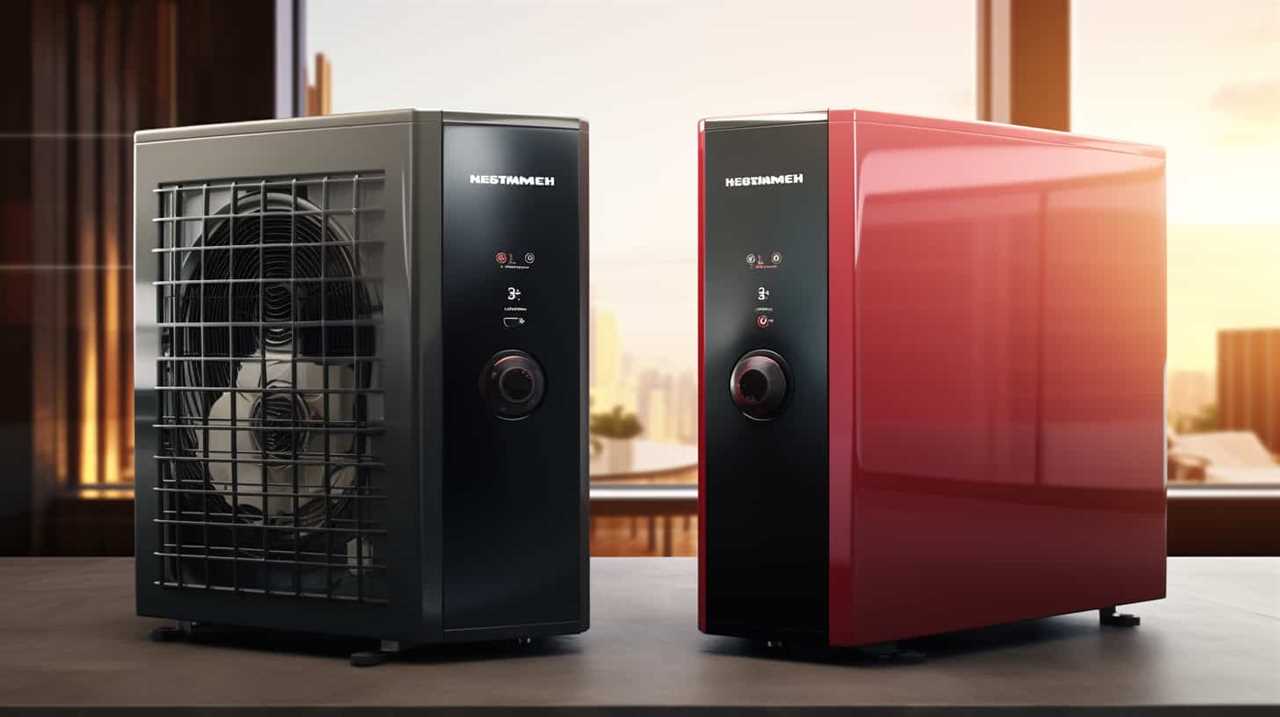
Another benefit of upgrading to an efficient heat pump system is increased home comfort. Heat pumps provide both heating and cooling capabilities, ensuring a comfortable indoor environment all year round. They’re also known for their ability to maintain a consistent temperature, eliminating hot or cold spots in the home. Additionally, heat pumps operate quietly and have advanced features like programmable thermostats, allowing homeowners to control and customize the temperature settings according to their preferences.
Tips for Optimizing the Energy Efficiency of Heat Pumps
To maximize the energy efficiency of our heat pumps, it’s essential to regularly maintain and clean the system. Here are some tips to help you optimize the energy efficiency of your heat pumps:
-
Regularly clean or replace air filters: Dirty filters can restrict airflow and cause the system to work harder, reducing its efficiency. Clean or replace the filters every 1-3 months.
-
Keep outdoor units clear: Ensure that there are no obstructions around the outdoor unit, such as leaves, debris, or tall grass. This allows for proper airflow and prevents the system from overworking.
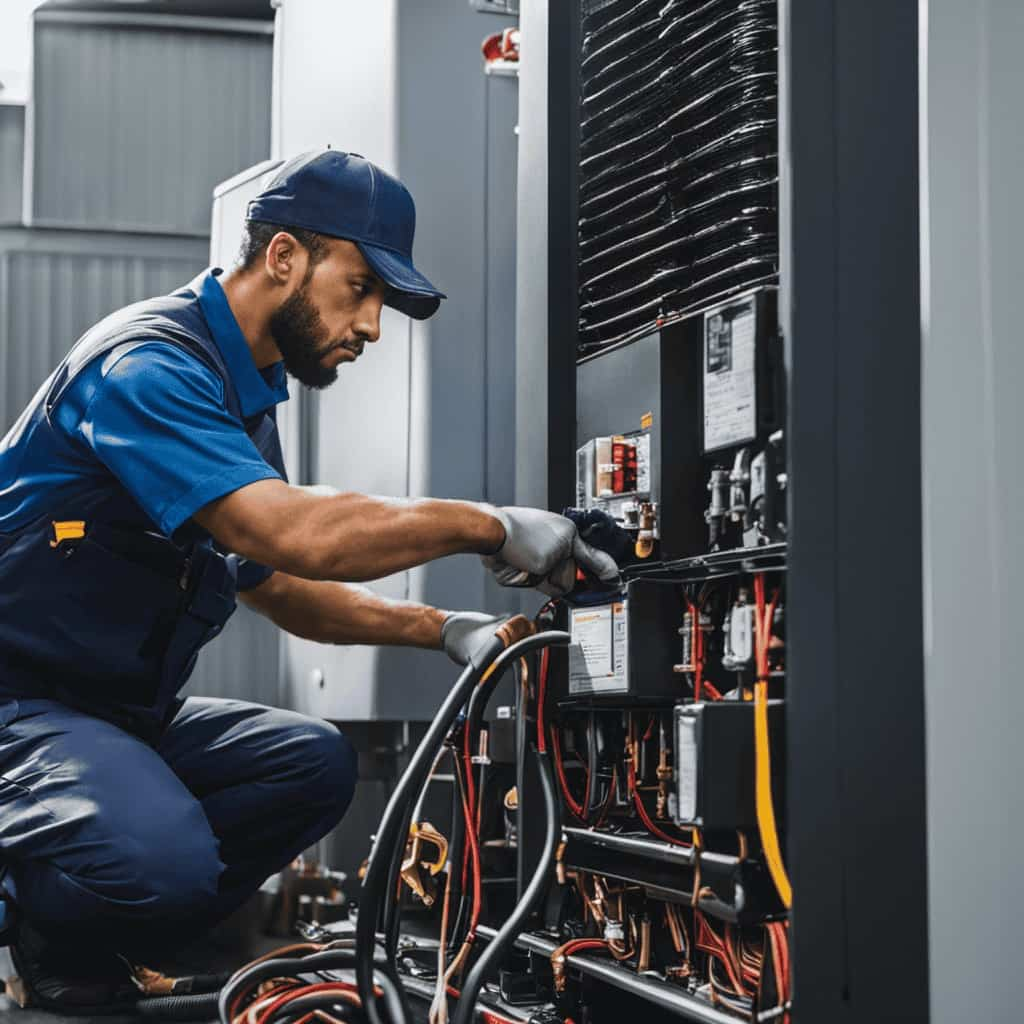
-
Set the optimal temperature: Keep the thermostat set at an optimal temperature to reduce energy consumption. Lower the temperature in winter and raise it in summer when away from home.
-
Utilize energy-saving techniques: Make use of features such as programmable thermostats to schedule temperature adjustments based on your daily routine. Additionally, consider using zone heating or cooling to direct airflow only to occupied areas.
Exploring the Cost-Saving Potential of Efficient Heat Pumps
Our research reveals the significant cost-saving potential of efficient heat pumps. By utilizing advanced technology and optimizing energy consumption, these heat pumps offer substantial savings on energy bills.
Efficient heat pumps are designed to minimize energy consumption while maximizing heat transfer, resulting in reduced energy costs. These pumps are equipped with features such as variable-speed compressors, which adjust their output based on the heating or cooling demand, further reducing energy usage. Additionally, advanced insulation and improved sealing mechanisms prevent heat loss, ensuring maximum efficiency.

Frequently Asked Questions
Are Efficient Heat Pumps Only Suitable for Certain Types of Homes or Buildings?
Efficient heat pumps can be suitable for various homes or buildings. The efficient heat pump installation process and factors to consider when choosing one depend on the specific requirements and energy needs of the property.
How Long Does It Typically Take to Recoup the Cost of Upgrading to an Efficient Heat Pump System?
It typically takes several years to recoup the cost of upgrading to an efficient heat pump system. However, the energy savings over time can help offset the initial investment and provide long-term financial benefits.
Can Efficient Heat Pumps Be Used in Both Hot and Cold Climates?
In both hot and cold climates, efficient heat pumps can be a game-changer. They outperform traditional heating systems in terms of efficiency, saving us money while keeping us comfortable. Climate does impact their efficiency, but they still offer significant energy savings.
Are There Any Government Incentives or Rebates Available for Installing Efficient Heat Pumps?
Government incentives and energy efficiency programs are available for installing efficient heat pumps. These programs aim to reduce energy consumption and promote the use of renewable energy sources, offering financial benefits to homeowners and businesses.

What Maintenance Is Required to Keep an Efficient Heat Pump System Running Optimally?
Regular heat pump maintenance is crucial for optimal performance. Servicing includes cleaning filters, checking refrigerant levels, inspecting electrical connections, and lubricating moving parts. This ensures energy efficiency and extends the lifespan of the system.
Conclusion
So there you have it, folks. Efficient heat pumps are like the superheroes of energy consumption, slashing those pesky bills with their incredible technology.
Upgrading to one of these bad boys won’t only save you money, but also make your home more energy efficient. And hey, who doesn’t want to optimize their energy efficiency?
So go ahead, explore the cost-saving potential of efficient heat pumps and watch your bills shrink faster than a melting ice cube.
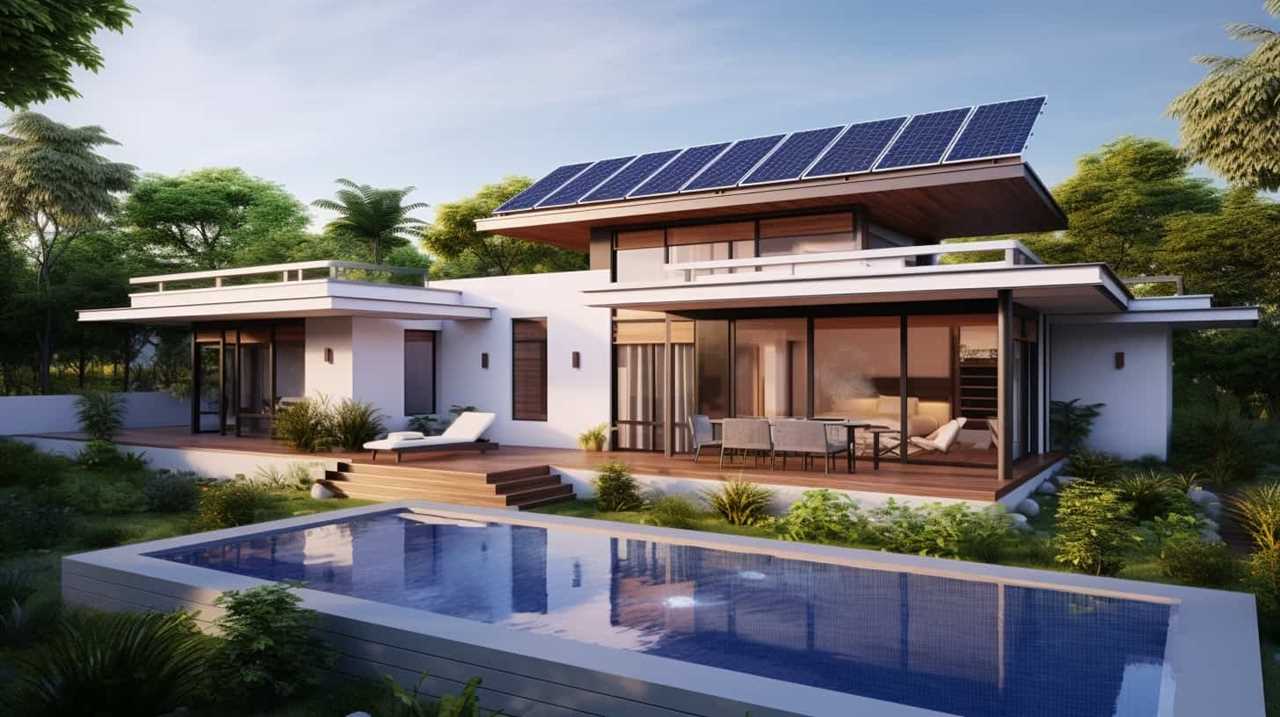
It’s a win-win situation, my friends.
Energy Efficiency
Green Advantage: Heat Pump Efficiency Cuts Environmental Damage

We’ve all felt the sweltering heat of summer or the bone-chilling cold of winter. But did you know that our traditional heating and cooling systems are wreaking havoc on the environment?
That’s where heat pump efficiency comes in. With its ability to reduce energy consumption and emissions, heat pumps have become an essential tool in combating climate change.
In this article, we’ll explore how heat pump efficiency can cut environmental damage and provide tips on maximizing its benefits. So let’s dive in and harness the green advantage!
Key Takeaways
- Traditional heating and cooling systems heavily rely on fossil fuels, contributing significantly to carbon emissions and exacerbating climate change.
- Heat pump efficiency ratings, such as SEER and HSPF, indicate greater energy efficiency and lower operating costs. Energy Star certification guarantees the heat pump meets strict efficiency standards.
- Heat pumps reduce energy consumption and emissions of traditional HVAC systems by extracting heat from air, ground, or water, requiring less energy compared to conventional heating methods.
- Maximizing heat pump efficiency and minimizing environmental damage can be achieved through regular maintenance, proper insulation and sealing of homes, utilizing programmable thermostats and zoning systems, and integrating renewable energy sources like solar panels.
The Environmental Impact of Traditional Heating and Cooling Systems
We can clearly see the damaging effects of traditional heating and cooling systems on the environment. These systems, which heavily rely on fossil fuels, contribute significantly to carbon emissions, exacerbating climate change.
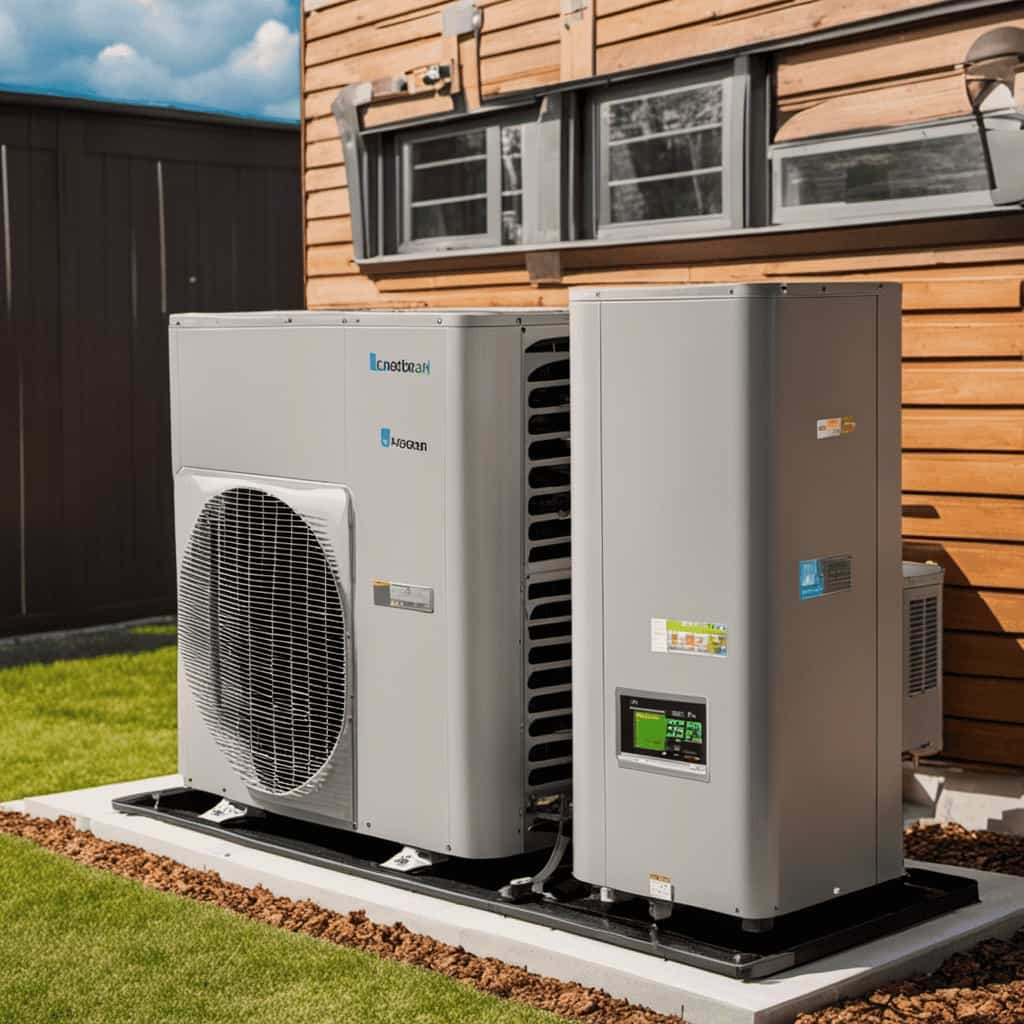
According to data from the U.S. Environmental Protection Agency (EPA), residential and commercial buildings account for 12% of greenhouse gas emissions in the United States. The burning of fossil fuels for heating alone contributes to approximately 10% of global CO2 emissions. This highlights the urgent need to transition to more sustainable heating alternatives.
By adopting heat pump technology, we can reduce our carbon footprint and mitigate environmental damage. Heat pumps utilize renewable energy sources such as air, water, or geothermal heat, providing efficient and environmentally-friendly heating and cooling solutions.
With their high energy efficiency and potential for using renewable energy, heat pumps offer a promising pathway towards sustainable heating.
Understanding Heat Pump Efficiency Ratings
Occasionally, heat pump efficiency ratings can be confusing, but understanding them is crucial for choosing the right system for your needs. Heat pump technology offers energy efficient heating and cooling solutions, making it an attractive option for environmentally conscious individuals.
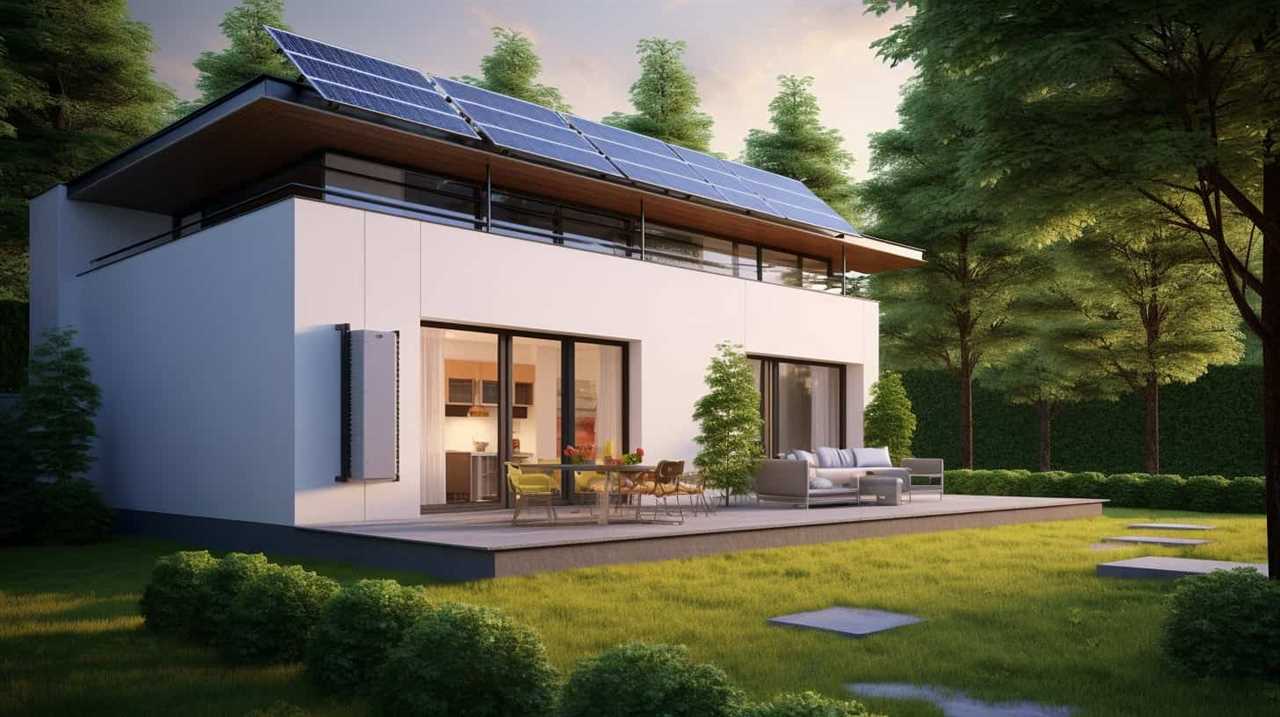
When evaluating the efficiency of a heat pump, it’s important to consider its Seasonal Energy Efficiency Ratio (SEER) and Heating Season Performance Factor (HSPF). SEER measures the cooling efficiency of the system, while HSPF measures its heating efficiency. A higher SEER or HSPF rating indicates greater energy efficiency and lower operating costs.
Additionally, it’s essential to understand the Energy Star certification, which guarantees that the heat pump meets strict efficiency standards. By familiarizing yourself with these ratings and certifications, you can make an informed decision and maximize the energy efficiency of your heating system.
How Heat Pumps Reduce Energy Consumption and Emissions
Reducing energy consumption and emissions, heat pumps offer an environmentally friendly solution for heating and cooling. By maximizing savings and utilizing advanced heat pump technology, these systems significantly reduce the environmental impact of traditional HVAC systems. Heat pumps achieve this by extracting heat from the air, ground, or water, and transferring it to the desired space. This process requires less energy compared to conventional heating methods, resulting in lower energy consumption and reduced emissions.
To illustrate the efficiency of heat pumps, consider the following table:
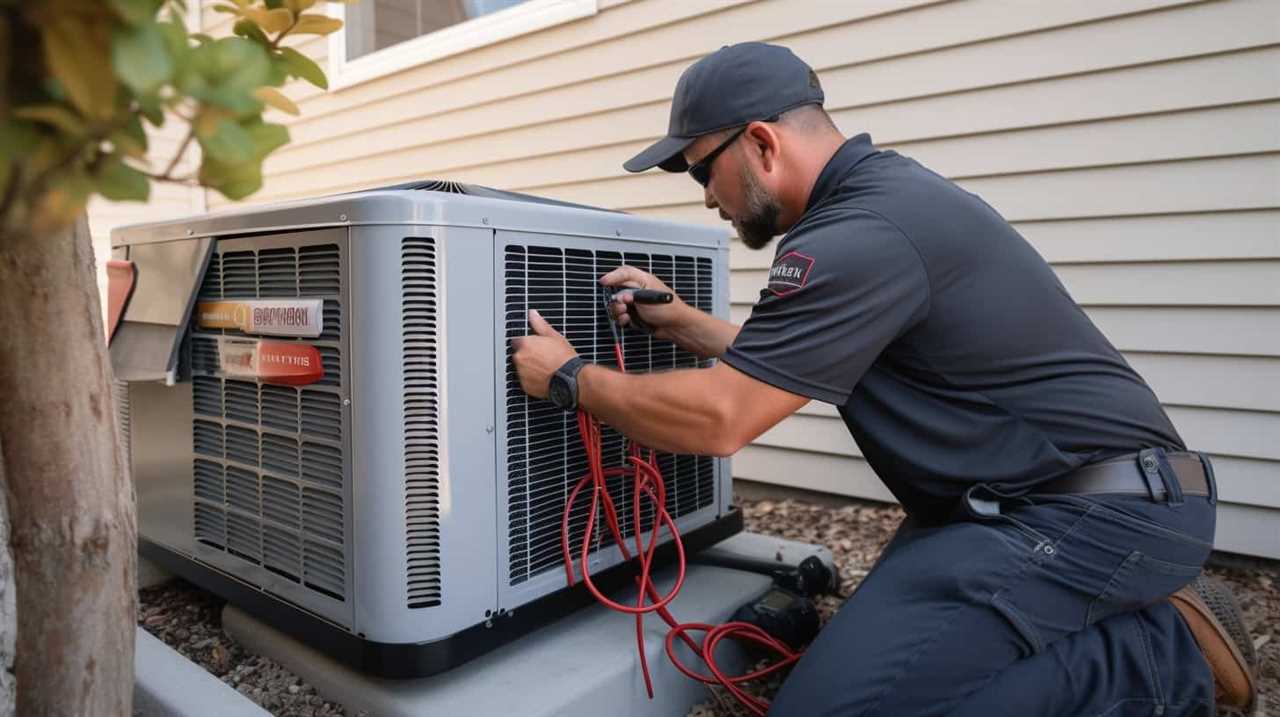
| Heating Method | Efficiency Rating |
|---|---|
| Heat Pump | 300-400% |
| Electric Furnace | 100% |
| Gas Furnace | 90% |
As the table shows, heat pumps can achieve an impressive efficiency rating of 300-400%, meaning they produce 3-4 units of heat for every unit of electricity consumed. In contrast, electric and gas furnaces have lower efficiency ratings, resulting in higher energy consumption and emissions. By choosing heat pump technology, individuals can enjoy both cost savings and a reduced environmental footprint.
The Role of Heat Pump Efficiency in Combatting Climate Change
Heat pump efficiency plays a crucial role in mitigating climate change by reducing greenhouse gas emissions. The advancements in heat pump technology have significantly improved their efficiency, resulting in lower energy consumption and fewer emissions. Government incentives for heat pump installation have further encouraged the adoption of this technology, leading to widespread usage and greater environmental benefits.
The following points highlight the deeper significance of heat pump efficiency in combatting climate change:
-
Enhanced energy efficiency: Heat pumps now have higher coefficients of performance (COP), meaning they can provide more heat or cooling for the same amount of energy input.

-
Reduced reliance on fossil fuels: By efficiently transferring heat from one place to another, heat pumps minimize the need for burning fossil fuels, which are major contributors to greenhouse gas emissions.
-
Decreased carbon footprint: The use of heat pumps helps to reduce carbon dioxide emissions, as they produce significantly fewer greenhouse gases compared to traditional heating and cooling systems.
Understanding the importance of heat pump efficiency sets the stage for maximizing their benefits and minimizing environmental damage.
Tips for Maximizing Heat Pump Efficiency and Minimizing Environmental Damage
To achieve optimal results and minimize harm to the environment, we need to implement practical tips for maximizing heat pump efficiency. By following these guidelines, we can’t only save energy but also reduce our carbon footprint.
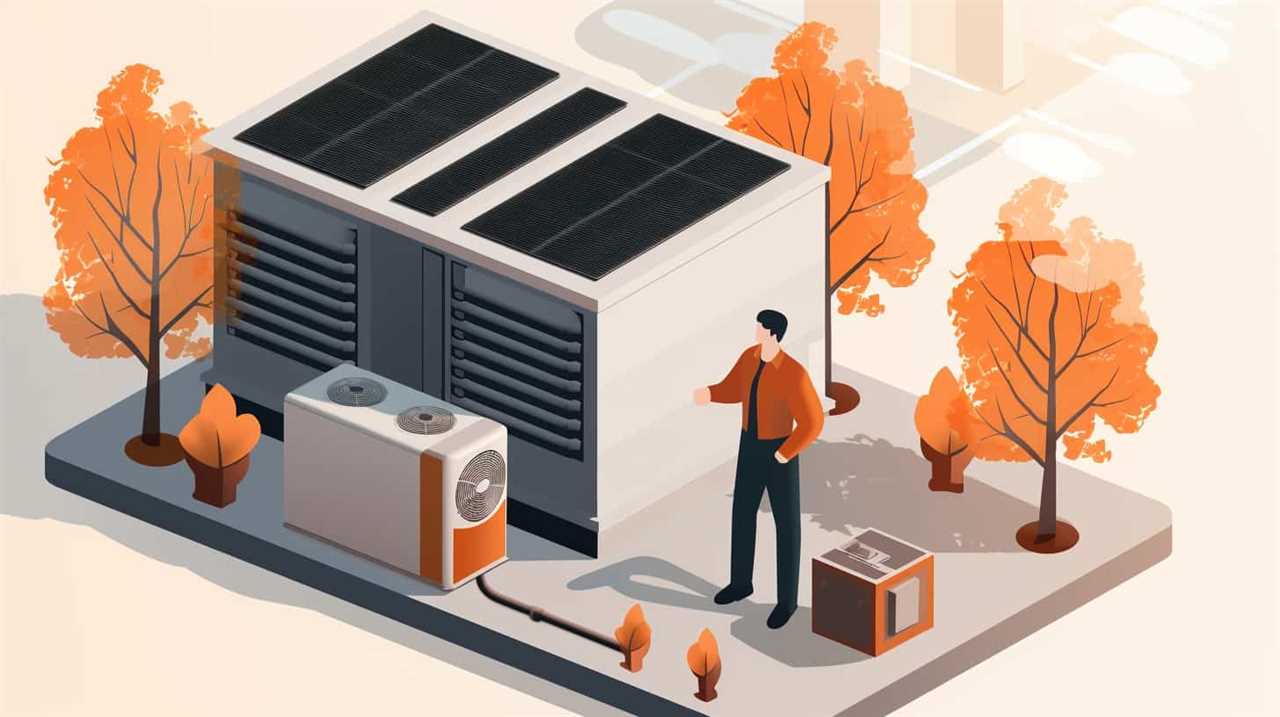
Firstly, it’s crucial to properly size and install the heat pump system to ensure efficient operation. This involves considering factors such as building size, insulation, and climate conditions.
Regular maintenance is also essential, including cleaning or replacing filters, checking refrigerant levels, and inspecting ductwork for leaks.
Additionally, utilizing programmable thermostats and setting temperature schedules can help maximize energy savings.
Lastly, integrating the heat pump with renewable energy sources, such as solar panels, can further reduce environmental impact.

Frequently Asked Questions
Are Heat Pumps Suitable for All Types of Climates?
Heat pump efficiency varies depending on the climate. While heat pumps are generally suitable for most climates, extreme cold or hot regions may require additional measures to ensure optimal performance.
What Is the Average Lifespan of a Heat Pump?
Heat pump maintenance is crucial for maximizing the average lifespan of a heat pump. Regular servicing and cleaning can ensure optimal performance and energy efficiency, reducing environmental damage and providing a greener advantage.
Can Heat Pumps Be Used for Both Heating and Cooling?
Yes, heat pumps can be used for both heating and cooling. This is a result of the advanced heat pump technology that allows for efficient transfer of heat in both directions, maximizing energy efficiency.
How Does the Cost of Installing a Heat Pump Compare to Traditional Heating and Cooling Systems?
Cost comparison between heat pumps and traditional systems shows long term savings. Heat pumps are more efficient, reducing energy consumption and lowering utility bills. Installation costs may be higher, but the savings over time outweigh the initial investment.
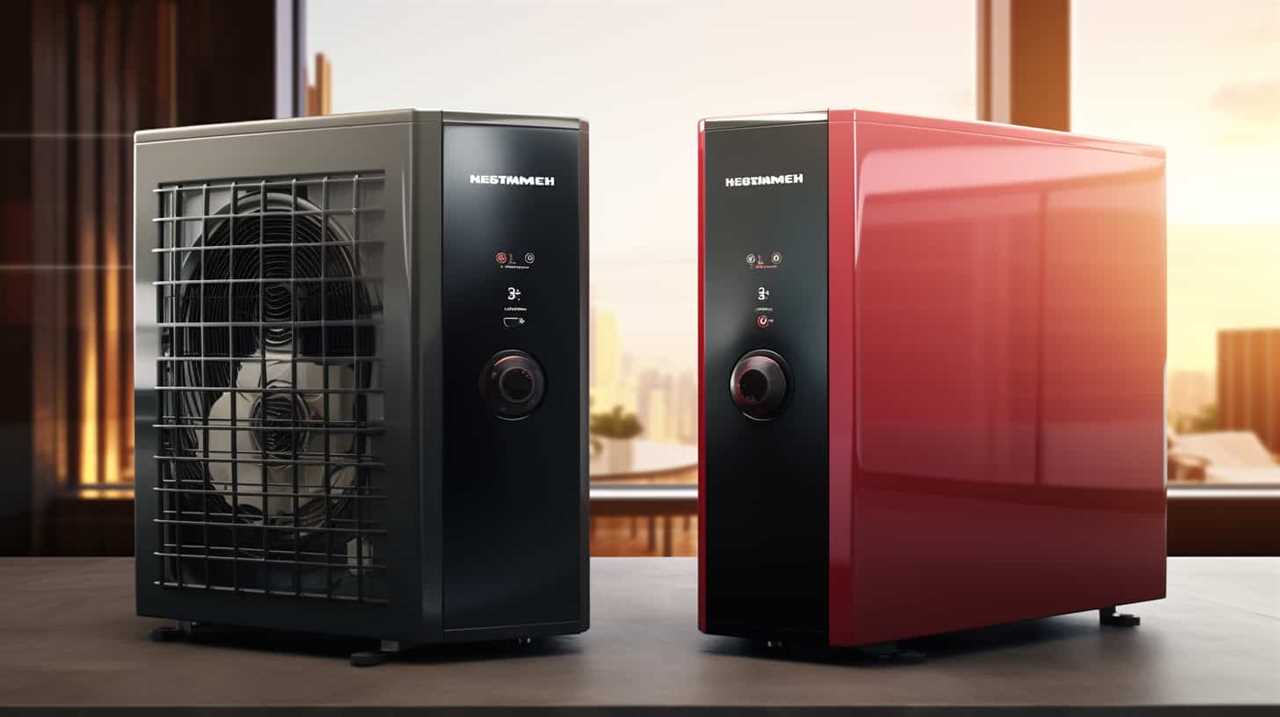
Are There Any Government Incentives or Rebates Available for Installing a Heat Pump?
Yes, there are government incentives and rebates available for installing a heat pump. These programs aim to promote energy efficiency and reduce environmental damage. Take advantage of these opportunities to save money and contribute to a greener future.
Conclusion
In conclusion, heat pumps offer a green advantage by significantly reducing environmental damage caused by traditional heating and cooling systems. With their high efficiency ratings, heat pumps minimize energy consumption and emissions, playing a vital role in combatting climate change.
To maximize heat pump efficiency and further minimize environmental impact, implementing simple tips such as regular maintenance and proper insulation is crucial.
By embracing heat pump technology, we can make a data-driven, analytical choice to protect our environment and create a sustainable future.
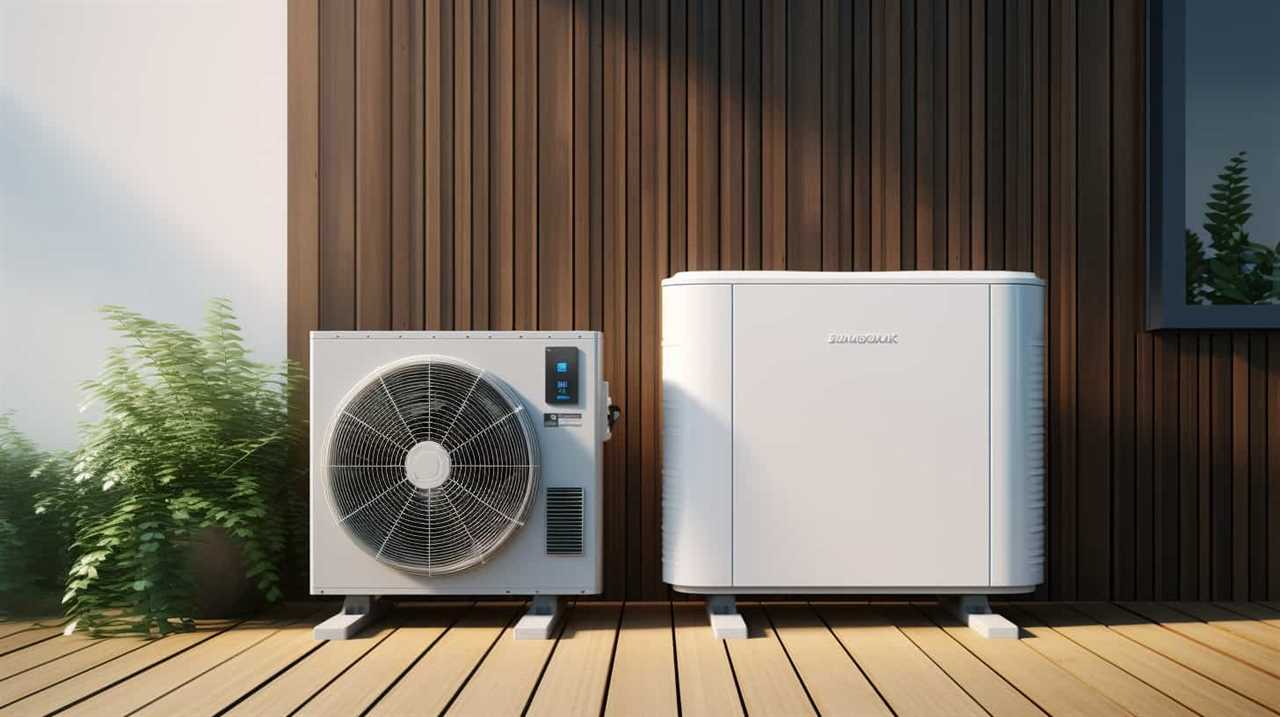
Energy Efficiency
Mastering Heat Pump Efficiency for Sustainable Homes

Welcome to our guide on how to maximize heat pump efficiency for sustainable homes. We’re here to assist you in understanding heat pump technology and finding the most effective ways to enhance its performance.
With our expertise, you’ll understand the efficiency rating system, learn about key factors affecting heat pump efficiency, and uncover the best practices for maintaining it.
Get ready to save energy and create a more sustainable future for your home. Let’s dive in!
Key Takeaways
- Heat pump technology reduces environmental impact and is cost-effective in the long run.
- The efficiency rating system for heat pumps, based on coefficient of performance (COP), helps homeowners maximize energy savings.
- Proper heat pump sizing, installation techniques, and regular maintenance are key factors affecting heat pump efficiency in sustainable homes.
- Optimizing heat pump performance through regular maintenance, adjusting thermostat settings, and sealing/insulating the home can result in maximum energy savings.
Benefits of Heat Pump Technology for Sustainable Homes
We love the energy-saving benefits of heat pump technology for sustainable homes. Not only does it reduce the environmental impact of our homes, but it also proves to be cost-effective in the long run.
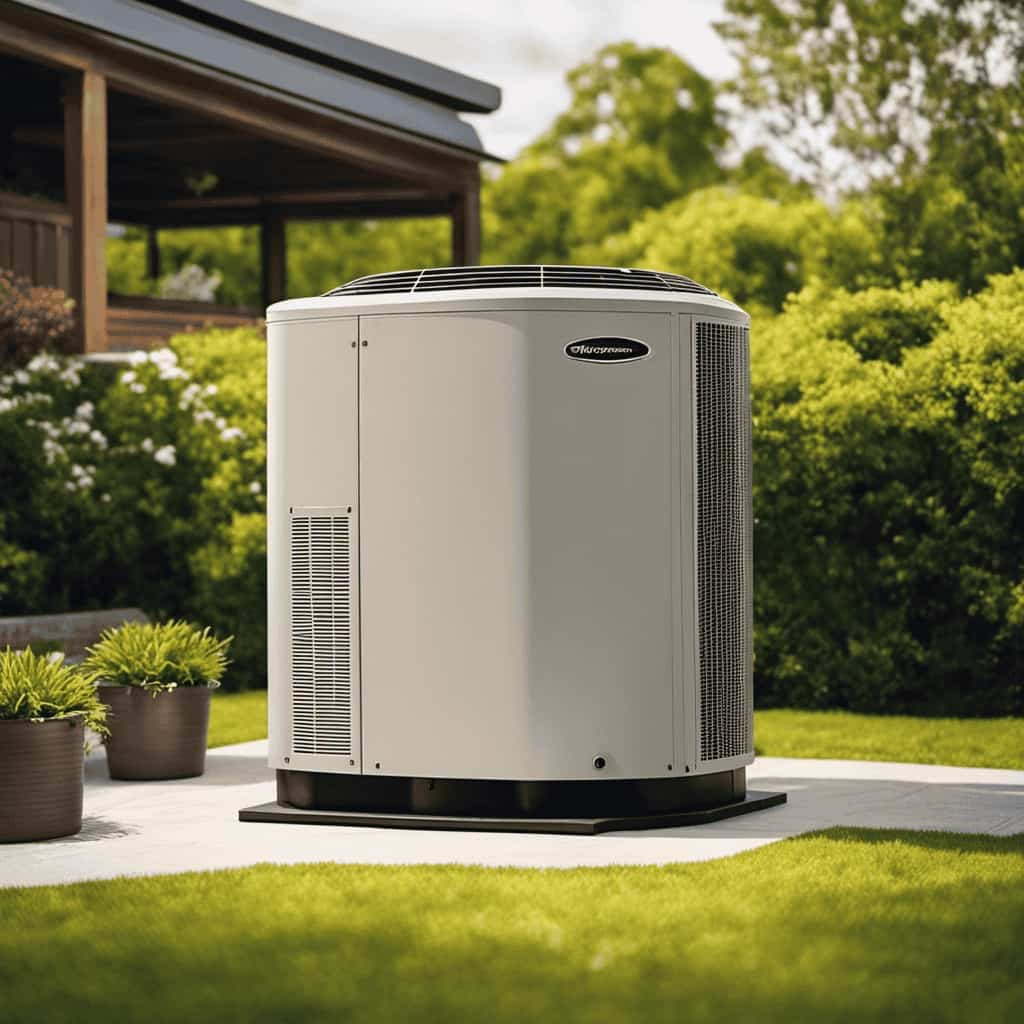
Heat pumps work by transferring heat from one place to another, rather than generating heat through combustion like traditional heating systems. This process requires less energy, resulting in lower electricity bills and reduced carbon emissions. Additionally, heat pumps can provide both heating and cooling, making them versatile and suitable for all climates.
The installation costs of heat pumps may be higher compared to traditional systems, but the energy savings over time make them a worthwhile investment.
Understanding the Efficiency Rating System for Heat Pumps
To fully comprehend the efficiency of heat pumps, we must understand the rating system that quantifies their performance. Heat pump efficiency standards are established to ensure that consumers have a reliable and standardized way to compare the efficiency of different models.
The rating system is based on heat pump efficiency testing, which measures the amount of heat produced by the pump relative to the amount of energy consumed. This is expressed as a ratio known as the coefficient of performance (COP). The higher the COP, the more efficient the heat pump is at converting energy into heat.
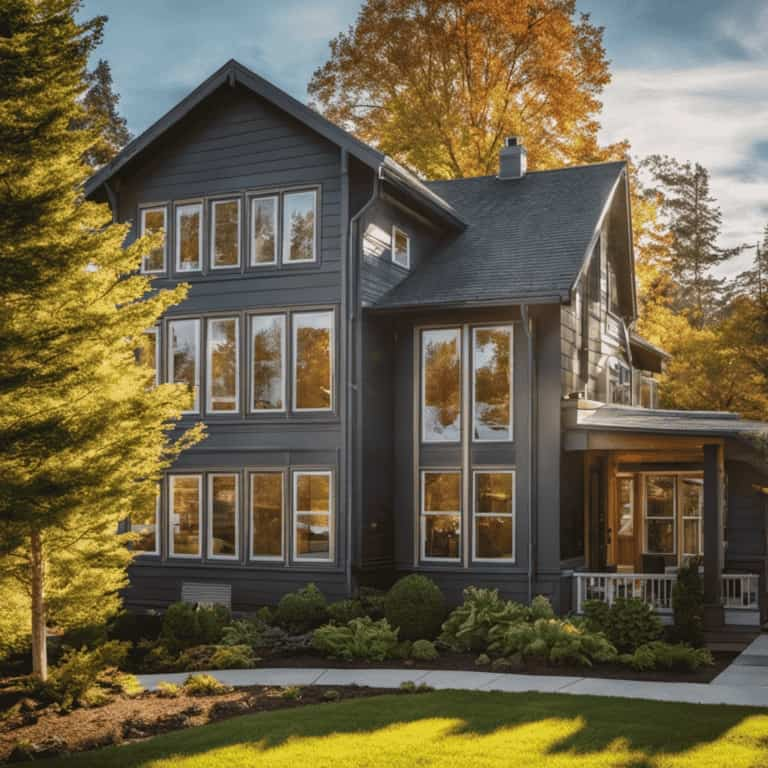
These efficiency ratings provide valuable information to homeowners looking to maximize energy savings and reduce their carbon footprint.
Now that we understand the efficiency rating system, let’s explore the key factors affecting heat pump efficiency in sustainable homes.
Key Factors Affecting Heat Pump Efficiency in Sustainable Homes
Since heat pump efficiency is crucial for sustainable homes, it’s important to understand the key factors that affect it. Here are some factors to consider:
-
Heat pump sizing: Choosing the right size heat pump for your home is essential for optimal efficiency. A heat pump that’s too large or too small won’t operate efficiently and may lead to increased energy consumption.
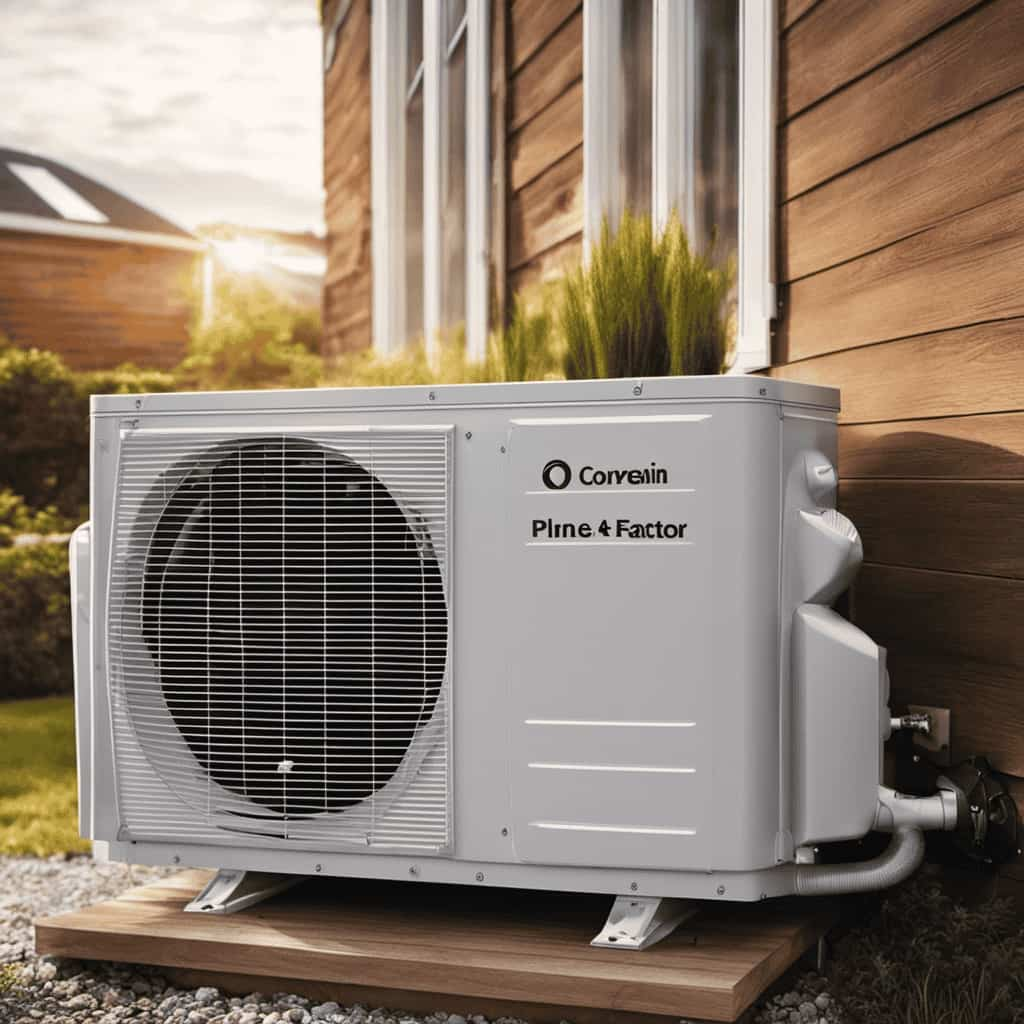
-
Heat pump installation techniques: Proper installation techniques are critical to ensure the efficient operation of a heat pump. This includes correct placement, proper insulation, and adequate airflow. Improper installation can result in reduced efficiency and increased energy usage.
-
Regular maintenance: Regular maintenance, including cleaning and inspection of the heat pump, is necessary to ensure its efficiency. Neglecting maintenance can lead to decreased efficiency and higher energy costs.
Understanding these key factors and taking the necessary steps to address them can help maximize the efficiency of your heat pump and contribute to significant energy savings.
Now let’s explore how to optimize heat pump performance for maximum energy savings.

Optimizing Heat Pump Performance for Maximum Energy Savings
By implementing three key strategies, homeowners can optimize their heat pump performance for maximum energy savings.
First, regular heat pump maintenance is crucial. Cleaning or replacing filters regularly ensures proper airflow and reduces strain on the system. Additionally, inspecting and cleaning the outdoor unit, coils, and fins removes dirt and debris that can hinder performance.
Second, adjusting the thermostat settings can greatly impact energy usage. Lowering the temperature in winter and raising it in summer reduces the workload on the heat pump.
Lastly, sealing and insulating the home helps maintain a constant temperature, reducing the need for the heat pump to work harder.
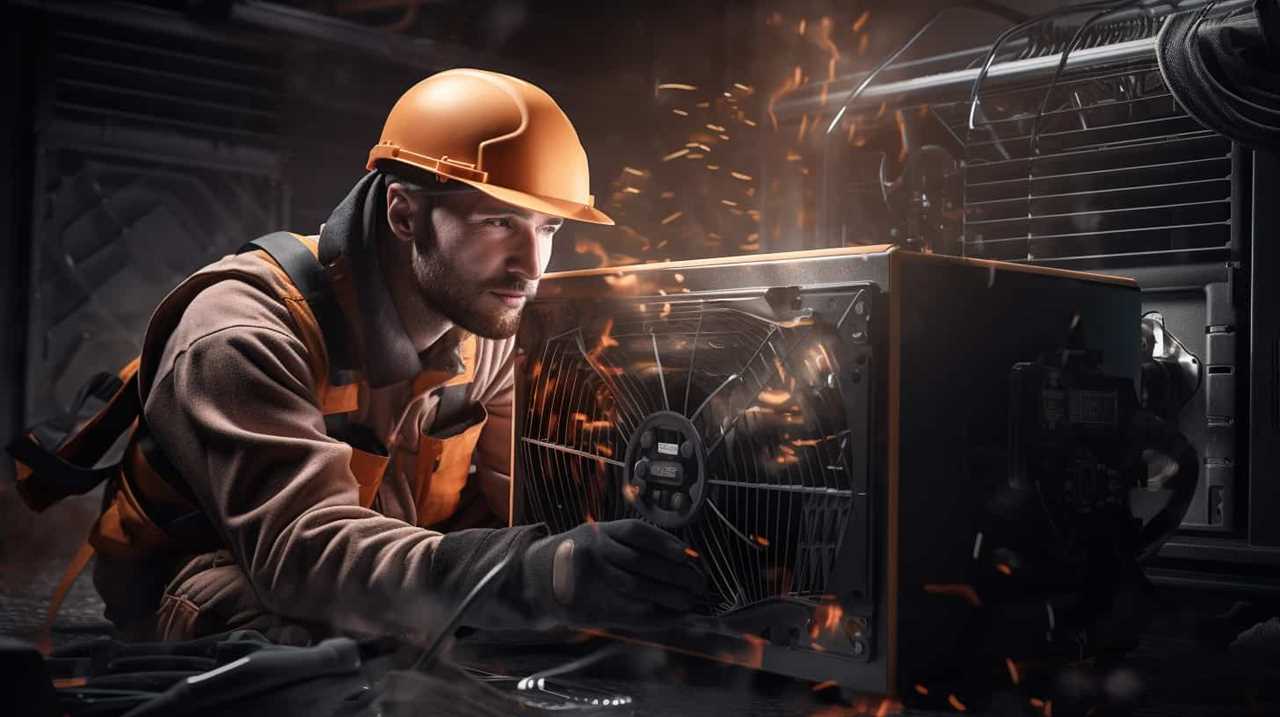
By following these heat pump maintenance tips and energy-saving strategies, homeowners can maximize efficiency and save on energy costs.
Now, let’s delve into the best practices for maintaining heat pump efficiency in sustainable homes.
Best Practices for Maintaining Heat Pump Efficiency in Sustainable Homes
We can ensure optimal heat pump efficiency in sustainable homes by implementing these best practices:
-
Regular heat pump maintenance: Schedule annual maintenance checks with a qualified technician to clean and inspect the system, ensuring it operates at peak efficiency. This includes cleaning or replacing filters, checking refrigerant levels, and lubricating moving parts.
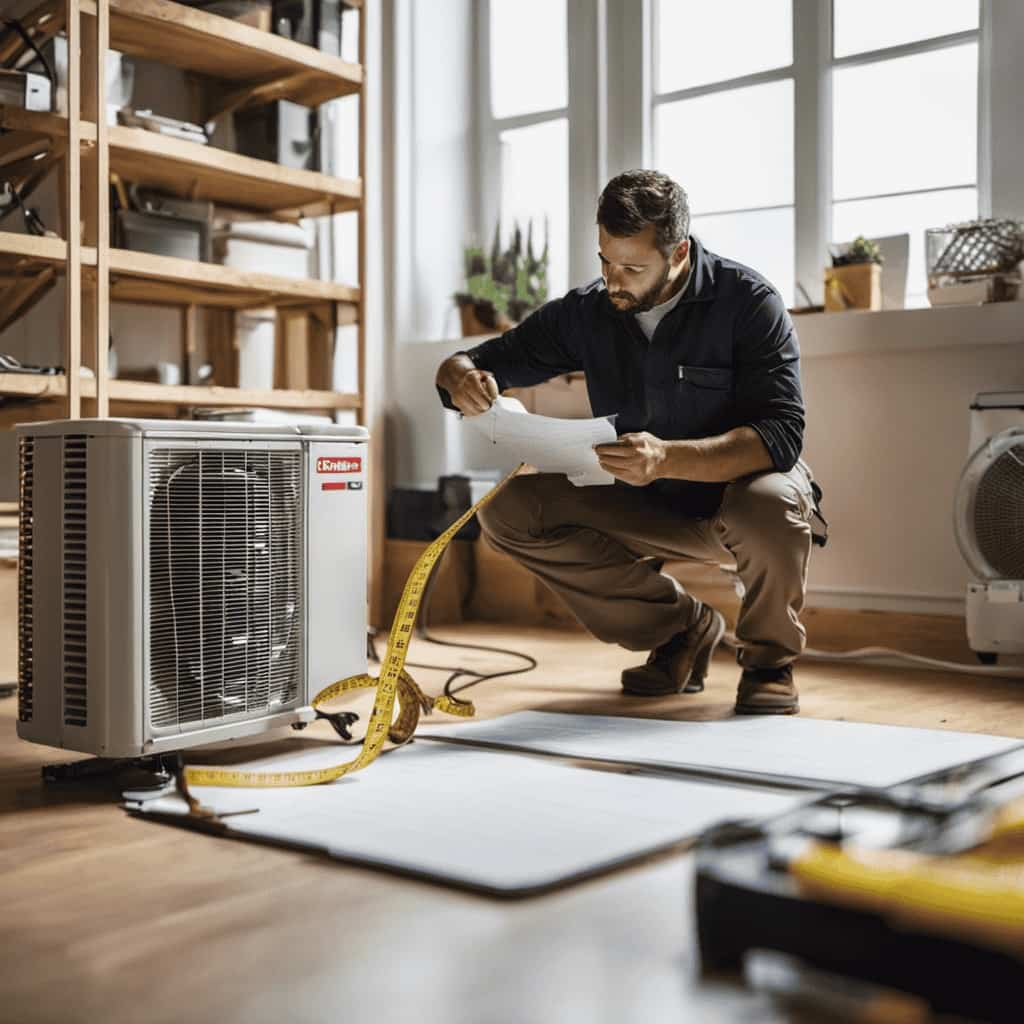
-
Maintain proper airflow: Keep the area around the heat pump clear of debris, vegetation, and obstructions to maximize airflow. Restricted airflow can reduce efficiency and strain the system.
-
Set appropriate temperature settings: Avoid setting the thermostat too high or too low. Optimal temperature settings can help the heat pump operate efficiently and minimize energy consumption.
Frequently Asked Questions
What Are the Different Types of Heat Pumps Available for Sustainable Homes?
There are various types of heat pumps available for sustainable homes. They offer numerous benefits like energy efficiency and reduced carbon emissions. Understanding the different types can help homeowners choose the best option for their needs.
How Do Heat Pumps Compare to Other Heating and Cooling Systems in Terms of Energy Efficiency?
Heat pumps, compared to traditional HVAC systems, offer greater energy efficiency, making them ideal for sustainable homes. Their ability to transfer heat rather than generate it means less energy consumption and lower utility costs.
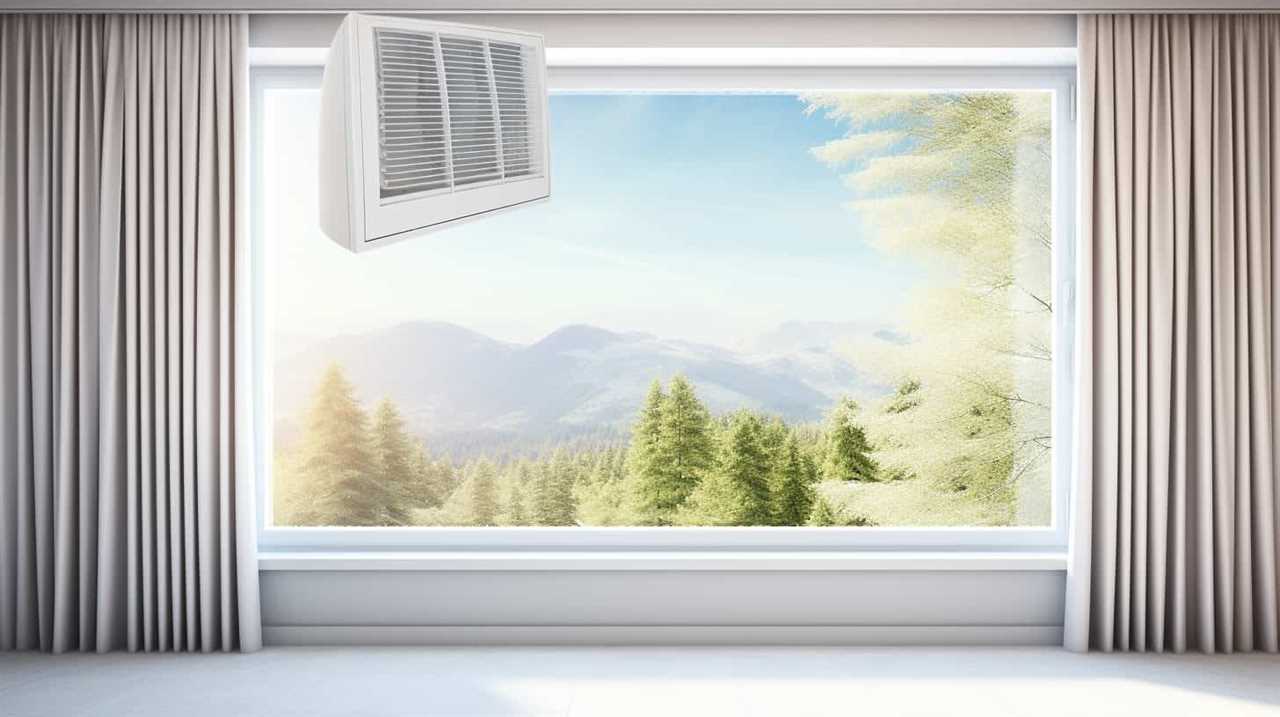
Can Heat Pumps Be Used in All Climates and Weather Conditions?
Heat pumps can function in various climates and weather conditions, but extreme temperatures can impact their performance. Weather conditions such as cold temperatures or high humidity can affect heat pump efficiency.
Are There Any Government Incentives or Rebates Available for Installing a Heat Pump in a Sustainable Home?
Yes, there are government incentives and rebates available for installing a heat pump in a sustainable home. These can significantly offset heat pump installation costs and provide potential savings from heat pump usage.
What Is the Average Lifespan of a Heat Pump, and What Maintenance Tasks Should Homeowners Regularly Perform to Ensure Its Efficiency?
To ensure efficiency and prolong the average lifespan of a heat pump, homeowners should regularly perform maintenance tasks such as cleaning or replacing air filters, checking refrigerant levels, and scheduling professional inspections.
Conclusion
In conclusion, mastering heat pump efficiency is crucial for creating sustainable homes. By understanding the efficiency rating system and optimizing performance, homeowners can achieve maximum energy savings.

It’s essential to maintain the efficiency of heat pumps through best practices. With these measures in place, we can create homes that not only reduce carbon emissions but also provide comfortable living spaces.
So let’s embrace this technology and pave the way for a greener future!
-

 Residential and Commercial Applications1 week ago
Residential and Commercial Applications1 week agoBest Amana Heat Pump Reviews
-

 Thermal Energy Transfer2 weeks ago
Thermal Energy Transfer2 weeks agoBreakthroughs in Modern Heat Pump Systems: Thermal Energy Edition
-

 Residential and Commercial Applications1 week ago
Residential and Commercial Applications1 week agoBest Heat Pump
-

 Geothermal Heat Pumps3 months ago
Geothermal Heat Pumps3 months agoUpgrade Your Comfort with Our Efficient HVAC Systems
-

 Air Conditioning2 months ago
Air Conditioning2 months agoExploring Energy-Efficient Air Conditioning Heat Pumps
-

 Geothermal Heat Pumps3 months ago
Geothermal Heat Pumps3 months agoInnovative Geothermal Heat Pump Manufacturers Revolutionize Energy Efficiency
-

 Thermal Energy Transfer1 month ago
Thermal Energy Transfer1 month agoBoost Your Heat Pump Efficiency: Interactive Guide
-

 Residential and Commercial Applications1 week ago
Residential and Commercial Applications1 week agoBest Portable Heat Pump Heat & AC










